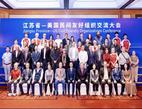Dr. Wang Xuefu, a famous Christian psychologist was invited to share a psychology lecture on the topic "Marriage, Family and Children's Education."
"I am my child's family of origin", Dr. Wang Xuefu said, "Knowing it is very important."
On April 17, the director of Nanjing Straightforward Counseling Institute talked about how we as parents need to realize that only if we change ourselves and create a better family culture environment for our children can we help them grow up better and get rid of fetters from families of origin.
During the lecture, Dr. Wang shared the major types of pastoral counseling, family systems theory in psychology and other theories related to children's education, and explained how these theories are applied in practice with his more than twenty years of counseling experience.
In particular, he talked about the famous attachment concept in family systems theory, which he believed was ignored in the Chinese culture.
"After a child is born, he becomes independent while being attached to his parents. When a child has a good attachment with his parents, he can have confidence and security, and he can develop the ability to be trusted by others. It's easy to feel insecure when he doesn't get fully attached to his mom early on. We have not fully appreciated this in our past culture."
He added that it was a common phenomenon in today's society to let children leave home at a very young age, such as leaving them in full daycare or at home with their grandparents as left-behind children. These led to many derivative problems with far-reaching effects that could subvert the foundation of our society's psychological personality from generation to generation.
Dr. Wang went on to talk about the family genealogy chart in family systems theory, and how we were influenced by our parents and we influenced our children, therefore it was necessary for us to know how to build a good family ecology, and this started with parents who first knew how to change themselves.
He also mentioned that we needed to treat the child as an individual, first and foremost, no matter how young he/she was.
"We often think that a child is very young and doesn't know anything yet, therefore we judge him/her as we please in front of him/her, whether he/she is two years old, three years old, five years old, ten years old, and still think he/she knows nothing," he said. These labels could have a negative impact on the child.
During the Q&A session, the audience was most concerned about how to raise children in a way that is beneficial to them. In the face of all kinds of questions about child upbringing, he summarized four suggestions for better child-rearing based on his years of observation and counseling.
Asked whether a child should have two to three friends at each stage, intimate interactions and relationships, and enjoyment of playing, which would give children ample experience in building relationships with peers, help children develop the wisdom, joy, and satisfaction to cope with a variety of relationships.
A participant raised another question, "Does the child acquire adequate understanding and gain support in an emotional sense from his parents? Does he/she have an awareness of rules and developmental rules? Does he or she understand the ways of the world and established values?"
"Your relationship with the world is your relationship with your parents," Wang said. "Children's feelings are very sensitive as they are growing up. If parents just do a lot of things for their children and always take care of them physically, but the child does not feel in his heart that parents care more about him or her, it only increases his/her guilt and does not help the child grow up well."
Regarding whether a child should read extensively beyond the textbook and curriculum, he responed that sometimes, children were learning textbooks just to cope with the test, but reading could help develop their independent thinking skills, cultivate their temperament, expand their minds, and so on. Therefore, it was important for your child to develop the habit of reading as early as possible to broaden his or her horizons.
"When a child works hard for an interest and tries to make it little by little, the child will constantly experience the pride that comes from the interest, thus developing the child's self-confidence," he claimed.
"What do children easily inherit from their parents? Some people answered 'habits', others thought it was 'temper', while others said it should be 'temperament'," Dr. Wang concluded, "Children inherit what they know best from their parents, which means if you want to pass on something to your child, you make it the most familiar to them."
- Translated by Wylie Sun












